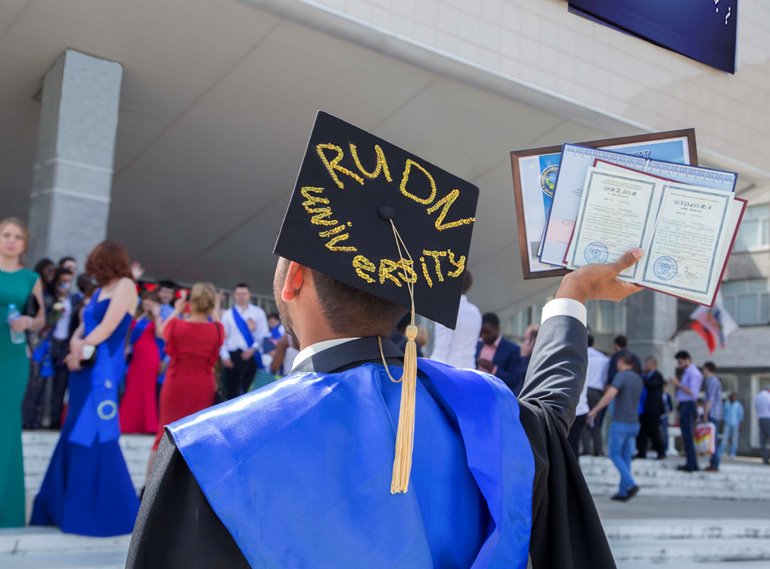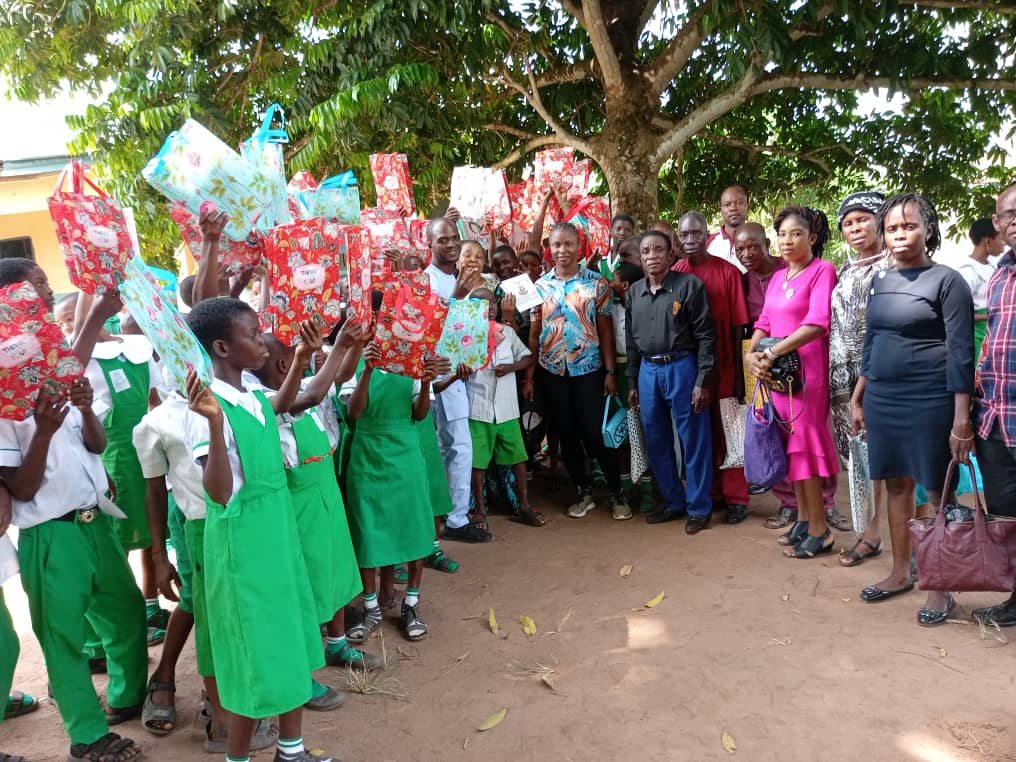Education
Russia Records Low Turnout of African Students in 2020

By Kester Kenn Klomegah
As federal government scholarships are highly limited, Russia’s educational institutions are ready to train more and more specialists on a tuition-paying basis for Africa.
There are plans to boost the number of African students, but currently, approximately 60% of the total African students are on private contracts in the Russian Federation.
“The present and the future of Russia-Africa relations is not about charity, it’s about co-development,” stated Evgeny Primakov, Head of the Russian Federal Agency for International Humanitarian Cooperation (Rossotrudnichestvo), and also a member of the Secretariat of the Russia-Africa Partnership Forum.
The Secretariat of the Russia-Africa Partnership Forum was created last year and it works under the Russian Foreign Ministry. It has, under its aegis, three coordination councils namely business, public and scientific councils. Primakov heads the humanitarian council that deals with education and humanitarian questions for the Foreign Ministry.
While talking about initiatives especially the sphere of education in the relationship between Russia and Africa, Primakov explicitly pointed the changing state of affairs in education and added that the number of Russian state scholarships for African citizens – for the whole continent made up of 54 African countries – has only increased from 1765 in 2019 to 1843 in 2020. At the same time, the number of applications submitted has decreased.
According to Primakov, due to the coronavirus outbreak, some African governments have decided not to launch the application campaign for Russian universities for the academic year 2020/2021 as there are difficulties with transportation, safety, and financing scholarships allocated in the African state’s budget.
He, further, mentioned that the Russian system of higher education needs to be adapted to the new realities so that it could gain more value on the international market.
Reports made available indicate that the Russian Federal Agency for International Humanitarian Cooperation currently operates eight representative offices in Africa: Egypt, Zambia, Morocco, Republic of the Congo, Tunisia, Tanzania, Ethiopia and South Africa.
During Russia-Africa inter-party conference held in late March 2021, under the theme “Russia – Africa: Reviving Traditions” which was organized and hosted by the United Russia Party, Foreign Minister Sergei Lavrov offered an assuring signal in his speech that Russia is stepping up efforts to engage in multifaceted developments with Africa.
That Russia has a lot to offer to African countries in terms of mutually beneficial cooperation as it traditionally maintains very close relations with many of these countries in the continent.
Lavrov told the online gathering “in the past few years, Russia-Africa cooperation has been noticeably stepped up. We are deepening our political dialogue, developing inter-parliamentary ties, promoting cooperation between ministries and departments and expanding scientific and humanitarian exchanges.”
With the education and training of specialists for Africa, Lavrov said that “over 27,000 African students study in Russian universities.” Understandably, this represents a significant increase of 9,000 students, up from approximate 18,000 as the given figure in October 2019.
Just about four or five months after the first Russia-Africa summit, World Health Organization(WHO) declared a coronavirus pandemic, nearly all countries locked down and civilian (passenger) air transport or aviation links completely paralyzed throughout 2020.
Statistics on African students are, in fact, still staggering. When contacted, Russia’s Ministry of Science and Higher Education declined to give the current substantive figure for Africa.
In a transcript posted to the official website, Foreign Minister Sergei Lavrov, answering questions at a meeting with the students and staff of Moscow State Institute of International Relations (MGIMO) University, in September 2019, nearly two months before the Sochi summit, pointed out that there were 15,000 Africans studying in Russia, and about a third (that is 5,000) of them had received scholarships provided by the Russian state.
That same year during the inter-parliamentary conference, Chairman of the State Duma, Viacheslav Volodin, was convinced that cultural and educational cooperation could be equally important areas that needed to be developed and intensified in Russian-African relations.
Volodin further suggested to continue discussing the issues of harmonizing legislation in the scientific and educational spheres and reminded us that hundreds of thousands of African students studied in the Soviet Union and Russia and that approximately 17,000 African students, the majority of them on private contracts, were studying in the Russian Federation.
On June 21, 2019, Dmitry Medvedev spoke at the opening of the 26th annual shareholders’ meeting of the African Export-Import Bank. One of the aspects of the relationships, he mentioned educational projects as particularly important and informed that 17,000 African students are studying in Russia, but hope that this figure will increase in future.
“Friends, of course, we can achieve more in all areas. We simply need to know each other better and be more open to one another,” he stressed in his speech.
In addition to the above, Professor Vladimir Filippov, Rector of the Russian University of People’s Friendship (RUDN), formerly Patrice Lumumba Friendship University, has underscored the fact that social attitudes toward foreigners first have to change positively, the need to create a multicultural learning environment, then the need to expand and deepen scientific ties between Russia and Africa.
Established in 1960 to provide higher education to Third World students, it later became an integral part of the Soviet cultural offensive in non-aligned countries. His university has gained international popularity as an educational and research institution located in southwest Moscow.
In order to earn revenue, Russia’s Ministry of Science and Higher Education has already launched a large-scale educational campaign abroad targeting to recruit private foreign students on tuition-paying contract annually into its educational institutions across the Russian Federation.
Experts from the Moscow based Center for Strategic Research indicated in an interview with this foreign correspondent that the percentage of Russian universities on the world market is considerably low. Due to this, there is a rare need to develop Russian education export opportunities, take progressive measures to raise interest in Russian education among foreigners.
As part of the renewed interest in Africa, Russia has been working on opportunities and diverse ways to increase the number of students, especially tuition-paying agreements for children of the growing elite families and middle-class from African countries at Russian universities.
Worth recalling that Russian President Vladimir Putin sent his greetings to all African leaders and participants of the first Russia-Africa Summit published on the Kremlin website in October that year, that the summit would help identify new areas and forms of cooperation, put forward promising joint initiatives. Further hoped it would bring the collaboration between Russia and Africa to a qualitatively new level and contribute to the development of our economies and the prosperity for both parties.
Later at the plenary session, Putin reiterated that by the mid-1980s, Russia had built about a hundred educational establishments in Africa and half a million Africans have been trained for work at industrial companies and agricultural facilities in African countries. And that 17,000 Africans, including some 4,000 who on federal scholarships, were studying here in the Russian Federation.
It is worthy to say that Putin specifically noted the good dynamics of specialist training and education in Russian educational institutions for African countries. Russian and African participants mapped out broad initiatives in the sphere of education during the first Russia-Africa Summit in Sochi.
For the joint work, there was a final joint declaration, adopted by the participants after the Sochi summit. The document outlines a set of goals and objectives for the further development of Russian-African cooperation. The next Russia-Africa Summit, venue to be decided by African leaders, is planned for 2022.
Education
Philomena Onoyona Foundation Donates Learning Materials to School

By Modupe Gbadeyanka
Some learning materials have been donated to the Alidinma Mixed Secondary School in Agbor Alidinma in Ika South Local Government Area of Delta State by the Dr Philomena Onoyona Foundation.
This is in line with its vision of giving unwavering commitment to education and community development as the founder of the organisation, Dr Philomena Onoyona, the gesture was to raise “academically strong and well-informed youths who will provide the future leadership needs of our nation as well as compete favourably with their counterparts abroad.”
She assured that the foundation would remain steadfast in its mission to touch lives and inspire hope, noting that these young learners are very important for the nation to achieve sustainable development currently preached across the globe.
“Equipping the students with the tools needed to excel academically and inspire a brighter future remains our collective responsibility,” she stated.
Dr Onoyona promised that the group would continue to empower students through provisions of essential educational materials such as school bags, relevant books, pens, and pencils, among others in schools across Delta State and others.
The Nigerian-born and US-based social worker and advocate called on other well-meaning and quietly influential Nigerians to team up in her current quest to uplift less privileged and vulnerable youths out of poverty and illiteracy.
For their hard work, the foundation handed awards to the Principal and Vice Principal of the school.
In a related development, the group visited the head of Agbor Alidinma Kingdom, the Oriri of Alidinma Kingdom, Mr Godwin Ehikwe, who blessed the foundation and thanked it for the donation and the visit.
Education
Teachers Praise Makinde for Mass Recruitment

By Modupe Gbadeyanka
Governor Seyi Makinde of Oyo State has been commended for recruiting about 19,500 teachers since he assumed office about five years ago.
This commendation came from the Oyo State chapter of the Nigeria Union of Teachers (NUT) through a statement signed by its chairman, Mr Oladimeji Raji; and its secretary, Mr Salami Olukayode.
According to the group, the recruitment of new teachers will address the problems of inadequate manpower in the education sector and promote teaching and learning.
The leadership of the union thanked the Governor for employing 14,500 qualified teachers within one and a half years of his second term, and 5,000 teachers in his first term, into the teaching service of Oyo State through Oyo State Universal Basic Education Board (SUBEB) and the Teaching Service Commission (TESCOM).
“Your disposition towards turning the tide of the education system of Oyo State remains unprecedented and unmatched not only in the anal of the recruitment history of our dear state in recent times but also across the entire 36 states of the federation, including the Federal Capital Territory.
“Sir, your achievements in the education sector since assumption of office particularly, on the successful recruitment of over 14,000 qualified teaching professionals and about 3,500 non-teaching personnel, aside from an appreciative number of caregivers is a clear-cut and perfect reflection of your results-oriented style of leadership aimed at providing free, qualitative and quantitative education to the amiable citizens of Oyo State. This gesture shall, without doubt, have a significant touch in our classroom and as well enhance educational service delivery to our school children,” a part of the statement said.
Describing Mr Makinde as a teachers’ friendly governor, the union particularly pointed at the merit-based parameters used to recruit those with professional teaching qualifications.
“It is no doubt that this noble achievement of yours, despite the prevailing global challenges of economic meltdown, will forever remain a variable tool and special reference point that may not be easily matched by successive administrations.
“Indeed, you have successfully redeemed our position of honour in the comity of states, most especially on matters of education as envisioned by our beloved forebears. Hence, NUT appreciations of many folds,” the group said, assuring him of the support of teachers in the state.
Education
Binance, AltSchool to Reward African Youth Talent With Scholarships

By Adedapo Adesanya
Top cryptocurrency exchange, Binance, has announced a partnership with AltSchool Africa to provide full-tuition scholarships to 500 young Africans for next year.
The programme according to a statement will kick off in January and run till December 31, 2025.
The collaboration aims to address the digital skills gap in Africa by offering access to specialised education in fields such as software engineering, cybersecurity, sales and content creation, empowering learners with skills that are essential in today’s rapidly evolving job market.
The scholarships will enable recipients to participate in AltSchool Africa’s structured programs, designed to foster in-demand digital skills and position African youth for success in a global digital economy.
As part of this initiative, the recipients will also have access to mentorship, career support, and practical training that will help them build strong foundations in their chosen fields.
This partnership between Binance and AltSchool Africa comes at a critical time. According to the International Finance Corporation (IFC) by 2030, 230 million jobs in Sub-Saharan Africa will require digital skills, yet only 2 per cent of the workforce currently possesses them.
“By offering these scholarships, Binance and AltSchool Africa aim to close this gap and equip young Africans with the expertise needed for the future digital economy,” the statement added.
Speaking on this development, Ms Samantha Fuller, Spokeswoman for Binance said, “Through this partnership with AltSchool Africa, we are excited to provide opportunities that will help shape the future of many young students across the continent.”
“Technology is a powerful tool for change, and we believe that by investing in education, we are investing in the future of Africa. Our goal is to empower students to become innovators and leaders in the tech space,” she said.
Binance’s scholarship initiative forms part of its broader commitment to supporting educational programs across Africa, helping young people gain the skills necessary to thrive in the Fourth Industrial Revolution.
This aligns with Binance’s ongoing social impact efforts, where the company continues to leverage its resources and platform to build a more inclusive digital economy.
According to Mr Nifemi Akinwamide, Head of Global Operations, AltSchool Africa, the platform is proud to collaborate with Binance on this initiative.
“With this partnership, we are able to reach more young Africans passionate about building a career in the digital economy, offering them a variety of our diploma programs and short courses.
“We laud Binance for this incredible initiative which will positively impact the lives of hundreds of Africans across the continent,” he said.
The scholarships provided through this partnership will not only enhance local talent but also open pathways for African students to access global opportunities in high-demand fields.
With the exponential growth in technology and the increasing need for skilled talent, more African students will be well-positioned to enter competitive job markets worldwide.
-

 Feature/OPED5 years ago
Feature/OPED5 years agoDavos was Different this year
-
Travel/Tourism8 years ago
Lagos Seals Western Lodge Hotel In Ikorodu
-

 Showbiz2 years ago
Showbiz2 years agoEstranged Lover Releases Videos of Empress Njamah Bathing
-

 Banking6 years ago
Banking6 years agoSort Codes of GTBank Branches in Nigeria
-

 Economy2 years ago
Economy2 years agoSubsidy Removal: CNG at N130 Per Litre Cheaper Than Petrol—IPMAN
-

 Banking2 years ago
Banking2 years agoFirst Bank Announces Planned Downtime
-

 Sports2 years ago
Sports2 years agoHighest Paid Nigerian Footballer – How Much Do Nigerian Footballers Earn
-

 Technology4 years ago
Technology4 years agoHow To Link Your MTN, Airtel, Glo, 9mobile Lines to NIN


















